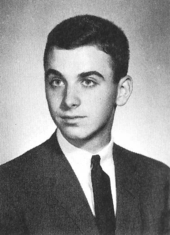 |
| Divine's high school yearbook photo at age 17 |
Described by People magazine as the "Drag Queen of the Century," Divine has has achieved cult status, particularly within the LGBTQ community.
 Harris Glenn Milstead, better known by his stage name Divine, was born today, October 19, in 1945. Divine was an American actor, singer, and drag queen closely associated with the independent filmmaker John Waters. Divine was a character actor, usually performing female roles in cinematic and theatrical appearances, and adopted a female drag persona for his music career.
Harris Glenn Milstead, better known by his stage name Divine, was born today, October 19, in 1945. Divine was an American actor, singer, and drag queen closely associated with the independent filmmaker John Waters. Divine was a character actor, usually performing female roles in cinematic and theatrical appearances, and adopted a female drag persona for his music career.Born in Baltimore, Maryland, to a conservative middle-class family, Milstead developed an early interest in drag while working as a women's hairdresser. By the mid-1960s he had embraced the city's countercultural scene and befriended Waters, who gave him the name "Divine" and the tagline of "the most beautiful woman in the world, almost."
After starring as the lead role in Waters' pictures Pink Flamingos and Female Trouble, Divine moved on to theater, appearing in several avant-garde performances alongside San Francisco drag collective, The Cockettes. He followed this with a performance in Tom Eyen's play Women Behind Bars and its sequel, The Neon Woman. Continuing his cinematic work, he starred in two more of Waters' films, Polyester and Hairspray, the latter of which represented his breakthrough into mainstream cinema.

The final scene in the film Pink Flamingos was particularly infamous, involving Divine's character Babs eating fresh dog feces. Divine told a reporter, "I followed that dog around for 3 hours just zooming in on its asshole," waiting for it to empty its bowels so that they could film the scene. The scene became one of the most notable moments of Divine's acting career and in film history, and he later complained of people thinking that "I run around doing it all the time. I've received boxes of dog shit – plastic dog shit. I have gone to parties where people just sit around and talk about dog shit because they think it's what I want to talk about." In reality, he only ate excrement that one time because it was in the script.
In 1974, Divine returned to Baltimore to film Waters's next motion picture, Female Trouble, in which he played the lead role. Divine's character, teenage delinquent Dawn Davenport, embraces the idea that crime is art and is eventually executed in the electric chair for her violent behavior. In the film, Divine did his own stunts, including the trampoline scene, for which he had to undertake a number of trampolining lessons. Divine also played his first on-screen male role in the film, Earl Peterson, and Waters included a scene during which these two characters had sexual intercourse as a joke on the fact that both characters were played by the same actor.
 Female Trouble proved to be Divine's favorite of his films, because it both allowed him to develop his character and to finally play a male role, something he had always felt important because he feared being typecast as a female impersonator. Divine was also responsible for singing the theme tune for Female Trouble, although it was never released as a single. Divine remained proud of the film, although it received a mixed critical reception.
Female Trouble proved to be Divine's favorite of his films, because it both allowed him to develop his character and to finally play a male role, something he had always felt important because he feared being typecast as a female impersonator. Divine was also responsible for singing the theme tune for Female Trouble, although it was never released as a single. Divine remained proud of the film, although it received a mixed critical reception.Divine again became involved with a John Waters project, the film Hairspray released in 1988. Set in Baltimore during the 1960s, Hairspray revolved around self-proclaimed "pleasantly plump" teenager Tracy Turnblad as she pursues stardom as a dancer on a local television show and rallies against racial segregation. As he had in Waters's earlier film Female Trouble, Divine took on two roles in the film, one female and one male.


Divine considered himself to be male, and was not transgender or transsexual. He was gay, and during the 1980s had an extended relationship with a married man named Lee, who accompanied him almost everywhere that he went. They later separated, and Divine went on to have a brief affair with gay porn star Leo Ford, which was widely reported upon by the gay press.
According to his manager Bernard Jay, Divine regularly engaged in sexual activities with young men that he would meet while on tour, sometimes becoming infatuated with them; in one case, he met a young man in Israel whom he wanted to bring back to the United States, but was prevented from doing so by Jay.
Divine died on March 7, 1988, three weeks after Hairspray was released nationwide. He died in his sleep, at age 42, of an enlarged heart.


2 comments:
One of the many who was taken from us long before his time ran the course it deserved. Despite this he left his 'mark' on history more indelibly than many longer-lived celebrities.
Btw: that infamous doggie scene was at the end of 'Pink Flamingoes' (1972). You may wish to amend your post.
"hairspray" - the original is THE BEST! there is and will forever be only one DIVINE!
Post a Comment